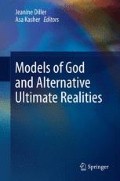Abstract
Though the very task of modeling God implies that the reality of God is to some degree unknown, there are a variety of positions one may take concerning the degree to which a model is informed by God’s reality. In this essay, I define four possible positions from which one might approach the construction of religious models: mysteriosophy, theopoetics, optimistic realism, and reticent realism. Of these four, I propose that reticent realism is the most advantageous method for constructing models of God. Reticent realism simultaneously assumes that our models are able, in principle, to refer to a divine reality, but must do so with a tentative stance. Absolute confirmation or universal consensus concerning the accuracy of the models will likely never be obtained. Reticent realism entails that models of God can and should be judged better or worse, though a single winning model must remain an eschatological hope.
This is a revised version of an article by the same name that appeared in Philosophia 35:3–4. I am indebted to Philip Clayton, Roland Faber, L.B.C. Keefe-Perry, Samuel Ruhmkorff, and Wesley Wildman for their critical feedback.
Access this chapter
Tax calculation will be finalised at checkout
Purchases are for personal use only
Notes
- 1.
This is not necessarily a fatal flaw. It could be the case that the majority of religious communities are wrong, and their concrete experiences are metastasized with cultural construction. Nevertheless, I think that authentically describing the self understanding and intention of adherents is one desideratum of an MGM.
References
Cobb, John B., Jr. 1999a. Responses to relativism: Common ground, deconstruction, and reconstruction. In Transforming Christianity and the world, ed. Paul Knitter. Maryknoll: Orbis.
Cobb, John B., Jr. 1999b. Order out of chaos: A philosophical model of interreligious dialogue. In Transforming Christianity and the world, ed. Paul Knitter. Maryknoll: Orbis.
Gadamer, Hans-Georg. 2000. Truth and method. New York: Continuum.
Heidegger, Martin. 1993. Letter on humanism. In Basic writings, ed. David Farrelll Krell, 213–266. San Francisco: HarperSanFrancisco.
Hick, John. 1989. An interpretation of religion: Human responses to the transcendent. New Haven: Yale University Press.
Whitehead, Alfred North. 1925. Science and the modern world. New York: The Free Press.
Wilder, Amos. 1976. Theopoetic: Theology and the religious imagination. Philadelphia: Fortress Press.
Author information
Authors and Affiliations
Corresponding author
Editor information
Editors and Affiliations
Rights and permissions
Copyright information
© 2013 Springer Science+Business Media Dordrecht
About this chapter
Cite this chapter
Hustwit, J.R. (2013). Can Models of God Compete?. In: Diller, J., Kasher, A. (eds) Models of God and Alternative Ultimate Realities. Springer, Dordrecht. https://doi.org/10.1007/978-94-007-5219-1_75
Download citation
DOI: https://doi.org/10.1007/978-94-007-5219-1_75
Published:
Publisher Name: Springer, Dordrecht
Print ISBN: 978-94-007-5218-4
Online ISBN: 978-94-007-5219-1
eBook Packages: Humanities, Social Sciences and LawPhilosophy and Religion (R0)

